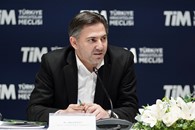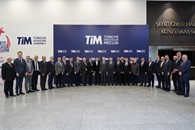The Future of the Sector Evaluated at the TİM Agriculture Council Meeting
At the meeting held at the Türkiye Exporters Assembly (TİM) Istanbul Foreign Trade Complex Hall, strategies concerning the future of the agricultural sector were thoroughly discussed.
Organized by the Türkiye Exporters Assembly (TİM), the TİM Agriculture Council Meeting was held at the Istanbul Foreign Trade Complex Hall. The meeting was attended by TİM Chairman Mustafa Gültepe, Deputy Minister of Trade Özgür Volkan Ağar, Deputy Minister of Agriculture and Forestry Dr. Ahmet Bağcı, TİM Agriculture Council Chairperson Melisa Tokgöz Mutlu, and Chairmen of Exporters' Associations.
“We must enhance productivity in our existing agricultural lands”
In his address at the meeting, TİM Chairman Mustafa Gültepe emphasized that agricultural production and access to safe food constitute a strategic issue, underlining that Türkiye possesses a longstanding experience in the field, a rich diversity of products, and an advanced industrial infrastructure with high technology. Gültepe stated, “We can transform these advantages into opportunities for our country. However, we must enhance productivity in our existing agricultural lands. In addition, we should focus on sustainable production, boost our digital capacity, and steer toward high value-added exports through processed products. Moreover, it is essential to build strong brands in agricultural commodities.”
Highlighting that crucial matters were addressed at the 2024 Expanded Council of Chairmen Meeting, which was also attended by the Minister of Agriculture and Forestry, Gültepe added, “Topics such as sustainability in agricultural and livestock production, quotas applied to exports to the EU, the competitiveness of agricultural production costs, and the improvement of product safety were brought to the agenda. Today, we aspire to further deepen these themes with our Deputy Ministers. To reach our goal of $50 billion in agricultural exports by 2028, it is of utmost importance to increase and diversify agricultural support schemes.”
“We are taking steps to enhance the export capacity of agriculture”
Deputy Minister of Trade Özgür Volkan Ağar underscored the importance of the agricultural sector to the Turkish economy, noting the intense efforts made to boost producers' and exporters' global competitiveness. Ağar stated, "The agricultural sector is one of the cornerstones of our country. Our producers and exporters are working with great dedication to elevate Turkish agriculture to a stronger position. As the Ministry, in close cooperation with the Ministry of Agriculture and Forestry and all relevant institutions, we are taking decisive steps to enhance the export capacity."
Referring to Türkiye's overall export figures, Ağar disclosed that total exports in 2024 amounted to $261.8 billion, while agricultural product exports rose by 5.42% compared to the previous year, reaching $32.5 billion. Noting that remarkable figures were also achieved across sub-sectors, he added, “Our exports of fruit and vegetable products reached $4.1 billion, vegetables $3.5 billion, hazelnuts and hazelnut products $2.6 billion, and seafood nearly $2 billion. I sincerely thank all our exporters behind this success.”
“We view the GATE Project as a strategic gateway to global agricultural trade”
Deputy Minister Ağar also addressed the impact of changing dynamics in global trade on the export of Turkish agricultural products, noting, "The rapidly evolving protectionist policies and global uncertainties in recent years pose challenges for our exporters. The policies implemented and potentially to be implemented by the United States are creating ambiguities in global trade. As the Ministry, we closely monitor these processes and strive to turn the challenges faced by our exporters into opportunities."
Touching upon strategic projects developed to boost exports in the agriculture and food sectors, Ağar emphasized the significance of the GATE (Overcoming Technical Barriers in Food and Agricultural Exports) Project, which is part of the “2025 Export Action Plan” announced on January 15, 2025.
Ağar said, “We consider the GATE Project a strategic gateway to global agricultural trade. In 2025, we will facilitate export processes to target markets for five priority products. In collaboration with our Ministry of Agriculture and Forestry, we aim to overcome SPS (Sanitary and Phytosanitary Measures) and technical barriers—two of the major obstacles to the export of our agricultural products—and thereby ensure a stronger presence in international markets.”
Deputy Minister Ağar emphasized that efforts to ensure sustainable growth in Türkiye's agricultural exports will continue unabated and reiterated their commitment to taking steps to strengthen the sector's competitiveness in cooperation with all stakeholders.
“We will utilize technology effectively to ensure sustainability in agriculture”
Deputy Minister of Agriculture and Forestry Dr. Ahmet Bağcı evaluated the agricultural sector's performance in 2024 and revealed significant targets for 2025. Stressing the Ministry's dedication to protecting producers' rights, Bağcı said, “The year 2024 was challenging for both us and our producers. However, agricultural gross domestic product recorded a higher increase compared to the national GDP. Our agricultural exports also grew by nearly 5%.”
Bağcı noted that the Ministry's two primary objectives are food supply security and food safety and acknowledged that these sometimes present challenges from an export and foreign trade regime perspective. Highlighting the priority of ensuring domestic market sufficiency, particularly in terms of food supply security, he stated, “This year, we faced serious bottlenecks in certain products and have taken the necessary measures accordingly.”
Bağcı stressed the importance of agricultural diplomacy in 2025 and expressed the Ministry's intention to further highlight agriculture's economic impact. He stated, “Food exports serve as an entry point to a country. Following agriculture, other sectors' export potential also increases. To reinforce this awareness, we will organize various programs.”
Underlining that the most crucial path to ensuring sustainability in agriculture is the effective use of technology, Bağcı remarked, “A review of global literature reveals that technology is the sole solution. We will focus on this area to increase productivity and ensure the accurate use of inputs.”
“We must take proactive measures and adapt swiftly to developments”
TİM Agriculture Council Chairperson Melisa Tokgöz Mutlu emphasized the significance of ongoing efforts to strengthen the sector from exports to production and from regulations to incentive mechanisms. She stated, “We are not merely exporters; we also produce for our people. Our aim is to deliver the highest quality at the best price to our tables while exporting high value-added products to generate net foreign exchange income for our country.”
Drawing attention to the Ministry of Agriculture and Forestry's efforts to support producers, sustain agricultural policies, and develop the sector, Mutlu noted, “In this context, the participation of our TİM Agriculture Council Chairmen in the 4th Agriculture Council held this year is a critical step for the future of the sector. I extend my gratitude to Deputy Minister Mr. Ahmet Bağcı for his support and cooperation throughout this process.”
Mutlu stated that TİM closely monitors the sector's development and added, “Through the TİM Agriculture Bulletins, monthly reports, and sectoral meetings, we will continue to share up-to-date data. The GATE Project, whose details will be presented today, stands as a concrete example of our strong collaboration with our Ministries of Trade and Agriculture. Within the scope of this project, problems will be identified on a country and sector basis, aiming to strengthen our agricultural sector.”
Declaring that their goal is to increase Türkiye's agricultural production and exports by 2027, thereby reinforcing foreign exchange inflows and bringing the current account deficit to a manageable level, Mutlu concluded, “We must take proactive measures and adapt swiftly to developments in the agricultural sector.”





